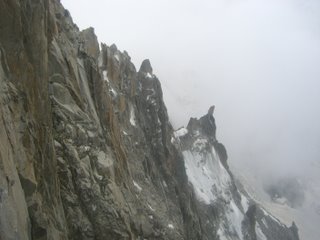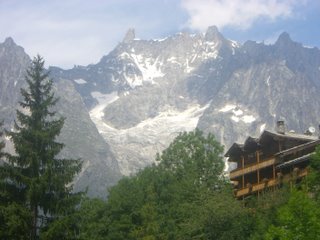Yasukuni Shrine seen to be hot issue in LDP leadership race
- Japanese Mainichi Daily News 毎日新聞 August 5, 2006
Poll: Majority of Japanese opposed to PM's Yasukuni visits
- Japanese Mainichi Daily News 毎日新聞 July 24, 2006
"At some point, Class-A criminals became enshrined.... That's why I have not visited the shrine since. This is my heart." - Japanese Emperor Hirohito (Showa)
August 15 marks the 61st anniversary of V-J Day, the end of World War II in Japan. Every year at this time, the question of the Japan's Yasukuni Shrine becomes a topic of HEATED debate inside Japan and also from Japan's neighbors in China and Korea. The regional newspapers burn the headlines on one issue: should the Japanese Prime Minister visit Yasukuni Shrine to honor Japan's fallen war heroes? Should the Japanese PM boycott Yasukuni Shrine because of the War Criminals who also are enshrined there? These are BURNING questions with lots of debate.
This week I learned something very interesting: The current and past Emperors of Japan boycott the Yasukuni Shrine. They REFUSED to go there, either in official or personal capacity.
First some explanation: Yasukuni Shrine (靖國神社) (literally "peaceful nation shrine") is a controversial
Shinto shrine located in
Tokyo,
Japan dedicated to the spirits of
soldiers and others who died fighting on behalf of the
Japanese emperor. As of October
2004, its Book of Souls lists the names of 2,466,532 men and women whose lives were dedicated to the service of Japan, particularly to those killed in wartimes such as Japanese and former colonial
soldiers. The Yasukuni Shrine also groups a total of 1,068 convicted of
war crimes by a post WWII court, including 14 convicted of Class A war crimes among the Showa Martyrs since 1978. The shrine also contains a controversial and allegedly revisionist history museum. -- courtesy Wikipedia
My Chinese and Korean friends hate the idea of a shrine for the soldiers and war criminals who wreaked such havoc and destruction on their countries. That's understandable. Japan's Prime Minister Koizumi's yearly visits to Yasukuni Shrine have caused a lot of hard feelings (to put it politely) among Japan's neighbors. This year Japan is in the the middle of elections for a new Prime Minister. Will the new PM continue Koizumi's tradition of visiting the shrine? Some candidates say no. Others won't say. Polls say the majority (54%) of Japanese people are opposed to the PM's Yasukuni visits. Politics as usual.
This week I learned something fascinating and new about Yasukuni: the previous and current Japanese Emperors have refused to visit the Yasukuni shrine since the Class A war criminals were enshrined in 1978. This is good news for people of good will. On the other hand, it is uncomfortable news for extreme nationalists in Japan and her neighbors. This interesting news comes from one of my favorite bloggers, The Angry Chinese Blogger,
http://20six.co.uk/angrychineseblogger/art/564629 Angry Chinese Blogger is a foreign writer who lives in Beijing. His writing is brilliant, but probably blocked in China, so I'll try to give a summary here.
14 of the dead in Yasukuni have been classified as Class-A (the worst of the worst) war criminals. Their crimes include mass murder and facilitation of atrocities such as the Nanking massacre. Although most of the Class-A war criminals were executed in 1948, or died in prison during the 1950s, they were not enshrined at Yasukuni until 1978. Due to the controversy surrounding it, their enshrinement was kept secret, both from the Emperor and the population at large. It did not become public knowledge until 6 months later, at which point it provoked outrage among the Japanese people.
Last week's Nihon Keizai Shimbun newspaper (commonly called the NiKei) published extracts from a series of official memos - taken by a senior member of the Imperial Household - which confirm that the late Emperor Hirohito choose to boycott the Yasukuni Shrine in disgust. After it was revealed to him that shrine officials had secretly allowed 14 Class-A war criminals to be interned at the site (in 1978), the Emperor refused to return.
"At some point, Class-A criminals became enshrined.... That's why I have not visited the shrine since. This is my heart." - Emperor Showa (As recorded by Tomita Tomohiko)
While his refusal to attend Yasakuni was widely known, neither Hirohito nor his staff had ever fully explained the facts of the matter. The recently published memos are the first official document ever to publicly confirm his personal views on this topic. Hirohito's son, the reigning Emperor Akihito, has also refused to attend Yasukuni.
The newly published memos come from a set of 20 notebooks, kept by Tomita Tomohiko in which they recorded conversations held with the late Emperor. Tomita was a senior member of the Imperial Household, becoming its Deputy Head in 1974 before rising to the rank of Grand Steward in 1978. Tomita held this position for 10 years, granting him close access to the reclusive Emperor. Tomita passed away in 2003, and the notebook records were provided to the Nihon Keizai Shimbun newspaper by family members.
The Angry Chinese Blogger points out that Tomita's memos are well received by most people. However, not everybody has greeted Tomita's memos with jubilation. Indeed, their very existence come as a great humiliation to extremists on both sides of the Sino-Japanese divide.
JAPAN: Many members of Japan's discredited and isolated nationalist minority claim fealty to the Emperor and former Emperor. At the same time, Yasukuni Shrine is one of this group's big causes. Until now, they have been at a loss to publicly explain why both Hirohito and Akihito have denied their cause by refusing to visit Yasukuni. Instead, these nationalist elements have tried to speculate about some other reason for the Emperors' boycott...some other reason than protest against the presence of Class-A war criminals.
Thanks to Tomita's memos, such nationalist denials are no longer possible.
CHINA: Just as the memos are damaging to Japanese nationalists - by removing their ability to claim the silent support of Emperor Hirohito - so have they been damaging to China's angry nationalists. The memos finally prove wrong any Chinese claims that Emperor Hirohito remained without remorse until the time of his death.
Tomita's memos resoundingly contradict any claims, by nationalist elements in either Japan or China, that Hirohito secretly supported the internment of Class-A war criminals in Yasukuni. These memos show clearly and definitively that he felt deeply about the presence of those who had ravaged China, Korea, and other neighboring countries. Out of disgust, the Emperor boycotted one of Japan's most important shrines.
For me personally, the release of Tomita's memos is fascinating. I hope someday they will be published in English language so I can read them. Until then, I'll try to see if I can find them on NiKei newspaper's English language site. Education, understanding, making friendships around the world is one of our best hopes to reducing wars and friction around the world.
















